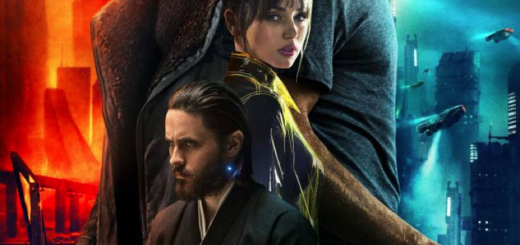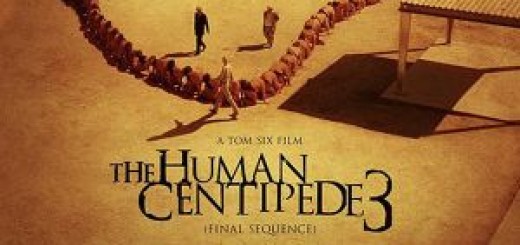WAR FOR THE PLANET OF THE APES Review
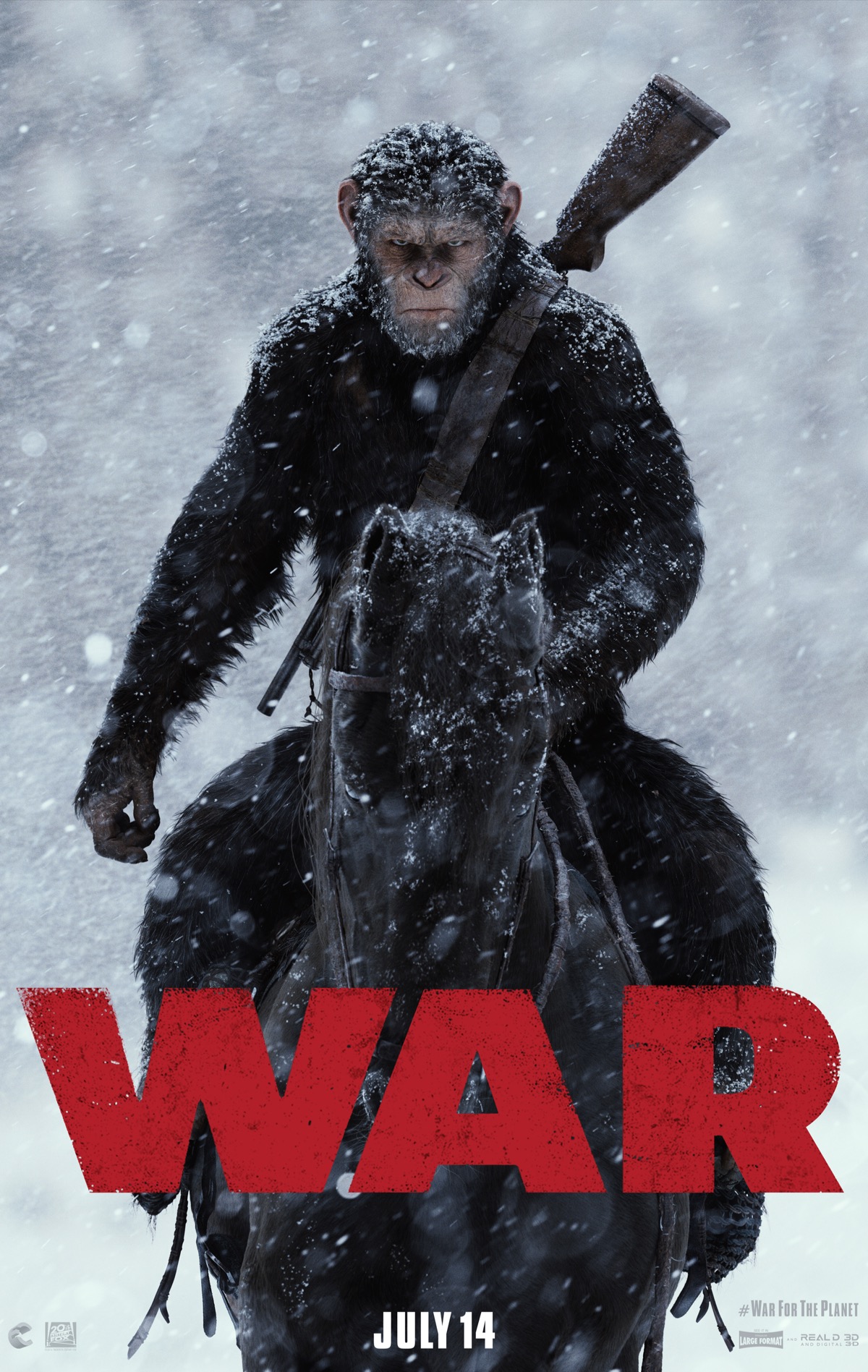
Director: Matt Reeves
Genre: Science-Fiction, Drama
Year: 2017
Scrawled on the walls of a depraved American commando’s living quarters is the word “history.” It doesn’t hold nearly as loud a place in the shot as some other production design details in WAR FOR THE PLANET OF THE APES (“ape-pocalypse now” graffiti comes to mind). The film, possibly the last in Caesar’s story, follows his ascension into the sphere of history. There’s a desire of late to place the $150-million-dollar-budget blockbuster itself in that sphere, a lot of ink getting spilled about classic Hollywood cinema, the Bible, Shakespeare, Oscar conversations, everything epic and of history, all things that must stay. It’s certainly not without design, or even a fair claim, especially as framed by the creators. “Inspirations,” they say, eyes towards everybody’s blogs. I think about the walls in the Colonel’s quarters and the idea of a leader that knows history, except it’s tortured for his own needs. WAR FOR THE PLANET OF THE APES would’ve been a much better film had it applied that idea for more than just set dressing.
Starting where the last led off, we follow a desperate conflict in the redwoods between Caesar’s ape colony and what’s left of humanity, a violent contingent of the US Military seemingly tasked with killing as many apes as possible. In the forest, all the ambitious name-dropped inspirations seem to come together, a wonderfully insane science fiction “ape-pocalypse now” that centers nature and the melodrama of kings. But this isn’t a war movie, if one was ever really possible, considering how devastating the Simian Flu was said to have been for humans. Contrary to title and posters and commercials, WAR FOR THE PLANET OF THE APES sidelines the broader human-ape conflict to instead focus on Caesar’s revenge-motivated mission up north to kill the Colonel and cut the head off the snake.
On a technical level, the film is something to behold. But it left me a little cold too. I think that if typical Hollywood cinematography is seeing through the eye of a machine in hopes you’ll instead invest in imagining sight through the eye of actors, then digitally manipulated cinematography is seeing through the eyes of multiple machines, at the very least one that photographs and one that draws, hoping you’ll imagine sight through the eye of the drawing. On one hand, this is a way for me to explain how Andy Serkis will not win an Oscar until enough academy voters can fully square the concept of Andy Serkis the performer with the notion that his performance is part drawn by machines (let alone drawn by a thousand visual effects artists), which isn’t impossible to imagine happening sooner rather than later. The other implication is that watching CGI characters interact at intimacies often reserved for reality-corresponding images of human faces means constantly thinking about the production of that face. If VFX is meant to make the impossible seem tangible like a magic performance, I wonder about the implications of constantly thinking, “Whoa, how’d they do that” during an otherwise emotionally-charged close up, of which there are many in this film.
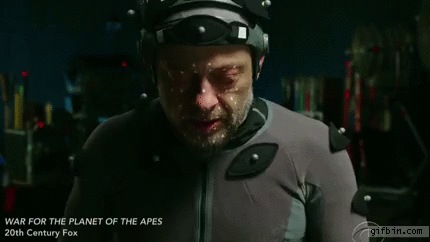
Ironically, this promotional clip is meant to erase the work of VFX artists
As for the story, well, a nuanced critique of history is a lot to ask for from a prequel franchise that can also be enjoyed for the fact of depicting animals with assault rifles, a practice I respect and partake in. But another principle joy of the prequel series is experiencing its absurdity as something intimate and true. We’d probably just call that watching good science fiction and fantasy, really. Reduced into components though, it’s clear that this time around a commitment to a certain intimacy and truth makes the film a slog. This is relentlessly Caesar’s story, and the effort to explain what it means as it happens, the capital-T truth of it, makes its unfolding feel routine.
The human-ape allegory at the heart of the franchise felt wrought with drama in DAWN OF THE PLANET OF THE APES because history had not yet happened. There was agency and hope for the ape project of building a better society, in spite of the seeds sown. Director Matt Reeves has said of the inevitability of the franchise that, “it’s no longer about what happens. It’s about how it happens. And stories about how are always about character and psychology.” But honing in on just Caesar’s psychological struggles with violence, mapping it one-to-one over his conflict with the Colonel, the film drastically limits itself. It really is just about what happens, to one individual against another, a book report for a conclusion; worse, it’s based on the most overrated book of all time.
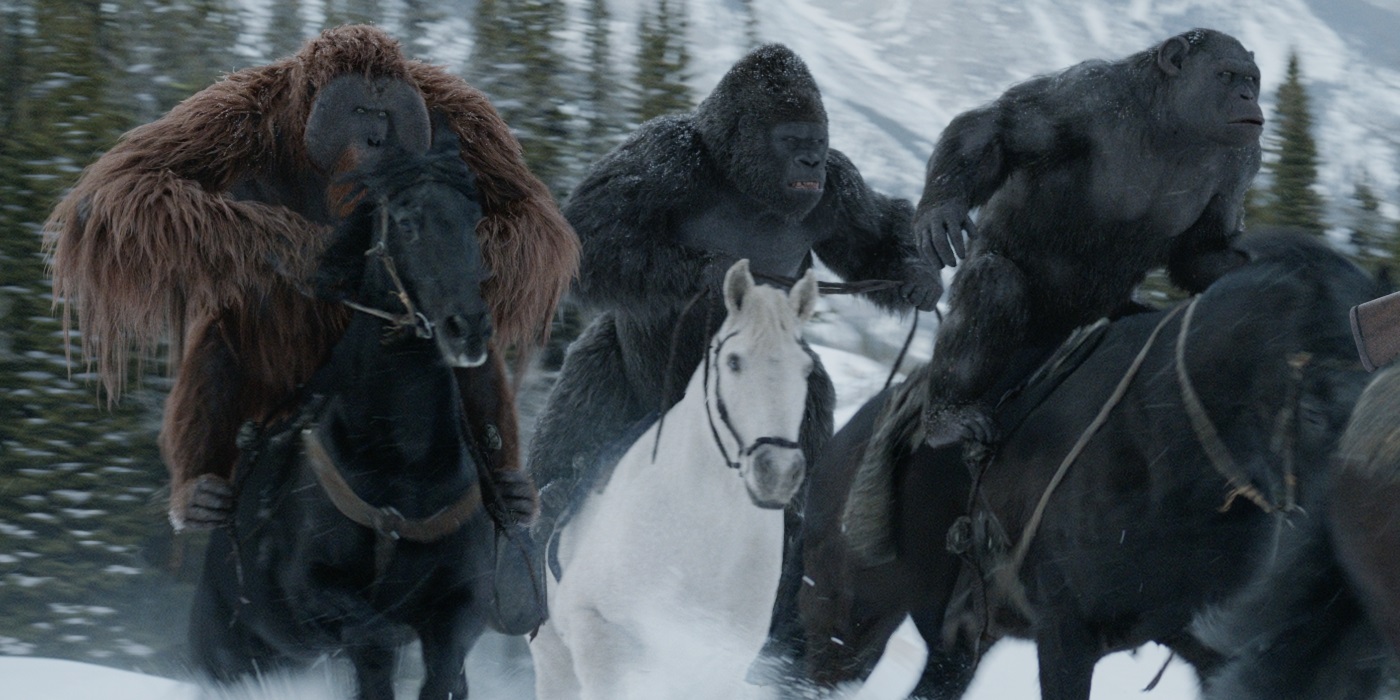
Heart of Darkness. Kidding. Sort of
To be fair, there are some powerful biblical allusions made in the film, and taking the story in the direction of mythical-historical is a bold and necessary thing. The series has always done its best storytelling with visuals. An early scene that imagines Seal Team 6 as demons is a highlight of the series, and unfortunately, the film itself, as the effort to mold the fiction toward the biblical gets less and less clever. The imagery of roving, laser-sighted death in a place of peace is biblical by itself because of our understanding of the Christian god that reaps and sows, of the history of conflicts past and present. It’s the Bin Laden raid with King David’s court for the compound. There are layers here, is what I’m saying.
But watching animals get whipped, enslaved, and crucified in a concentration camp by a man who imagines himself a god are images not really alluding to anything so much as being labeled with an obvious footnote to check off boxes in a singular kind of history, the most boring one: cruelty as destiny. In DAWN OF THE PLANET OF THE APES, the beauty of the redwoods played to a hope for the end of human depravity, finding meaning and tension in the natural possibilities of before. This film depicts depravity because that’s what happens after you try. Histories are often the story of failure, sure, but movies that only aspire to histories of failure are certainly failures of imagination.
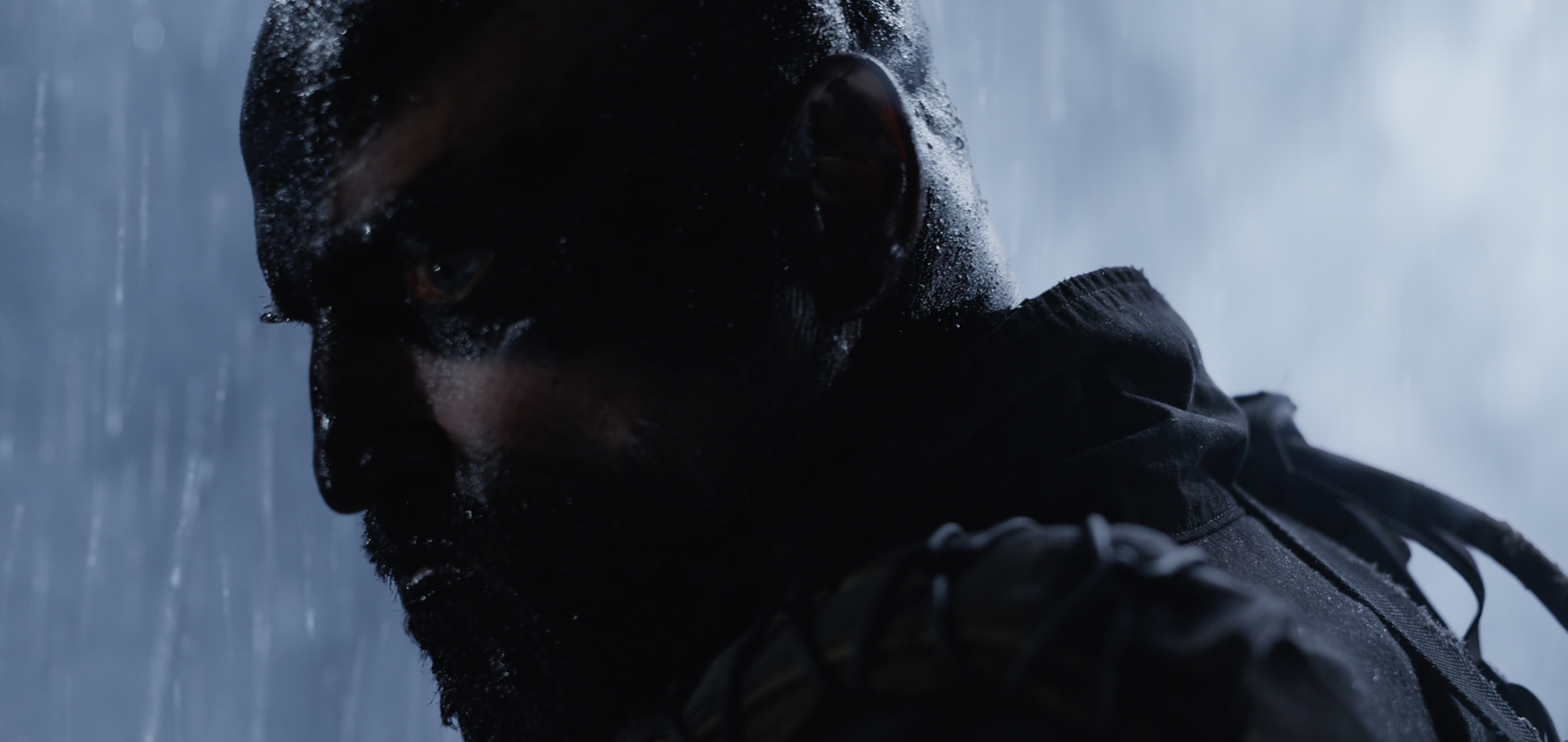
Hell is empty and the US Military is here
I wonder how else this film could have been done, considering the context it was made. It would take as dramatic a reimagining of the franchise premise as RISE OF THE PLANET OF THE APES was, a near present-day drama with a CGI ape as its main character. Actually being about a war is a good start. In the end, the difficulty is that the series has, whether by plot-twist or reboot, always been told under a millennia-long, planet-wide fume of unavoidable and catastrophic societal failure. It’s bleak as hell, and basically dumb. Yet in DAWN OF THE PLANET OF THE APES, where that inevitability became even more acute, still there was something beautiful and engaging about the collective struggle against it. WAR FOR THE PLANET OF THE APES has the least interesting take on the drama of societal conflict, ultimately showing hope for change anywhere but in the hearts of violent great men or angelic blond girls as uninformed, because don’t you know history? Groups don’t change.
There is an implication at the end that a failure to know history causes it to repeat. That’s no doubt true. But which history does the Colonel know? Grappling with that would’ve meant really telling a story about “how it happens,” as Reeves says. Instead, the story of Caesar closes without delivering on the greenlight premise of the prequels, probably because they want to make more, but I digress. We’re not shown “how it happens,” left instead to fill in the gap with our darkest understanding of human nature and what we know about the wages of suffering, as if transcendence was the only model for spirituality. WAR FOR THE PLANET OF THE APES concludes that all along the true transspecies universal was forgetting Christ’s teachings. I’m sure the Colonel would agree.
Verdict: Do Not Recommend


